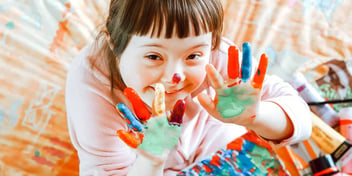9 Ways Divorce Can Strengthen the Parent-Child Relationship

You may believe that staying married despite a bad relationship is better for the kids – that bringing them up in a two-parent household provides more stability. But if your marriage has deteriorated to a point where you’re considering divorce, your kids are likely to be feeling the stress. It may have even become a toxic atmosphere for them.
Divorce alleviates a lot of this stress. It also provides opportunities for deeper connections and growth for your children.
You’ve undoubtedly heard about the potential adverse outcomes for kids of divorce. But if divorce is handled carefully, children often adjust to adulthood better than those who were surrounded by conflict in a two-parent household.
Here are nine ways in which divorce could help strengthen your relationship with your kids.
1. Happier parenting
Parenting can take a backseat when you’re in the middle of an unhappy marriage. It’s difficult to be a happy, healthy, and engaged parent when you’re navigating a rocky relationship. No matter how careful you try to keep your kids out of it, they usually know what’s happening.
Removing yourself from your unhealthy marriage allows you to be a happier, healthier person and parent. Without that emotional drain, you’re more calm and available to the kids. And not seeing their parents fight all the time can help your kids be happier, too.
2. Increased one-on-one time
Divorce isn’t just about division. In some cases, it gives parents more dedicated time with their kids.
Child custody arrangements are usually designed so both of you get critical one-on-one time with your children. This means a parent who didn’t spend as much time with the kids due to outside factors (like work) now has scheduled quality one-on-one time. The scheduling of this time can pave the way for that parent to take a more active role in the kids’ lives.
More time, focus, and intentional shared activities can translate to a stronger bond with your child and a greater sense of stability.
3. Develop resiliency
Divorce is one of life’s major adversities, and kids of divorce get front-row seats. Adapting to change and adversity is usually built over time, but children of divorce often develop resiliency at an earlier age.
When handled carefully, divorce can help make children stronger and more resilient. They learn that difficult situations can be transcended and dealt with positively.
The children of co-parents who divorce respectfully and cooperatively learn that they can persevere and succeed amidst life’s trials. This helps them develop resiliency that enhances their lives long-term.
4. Learn boundaries
Establishing healthy boundaries is essential, and the best way to teach your kids about healthy boundaries is to model them yourself.
With flexible and cooperative co-parenting, your kids will see what healthy boundaries look like and how they’re established. This doesn’t mean there won’t be any conflict, but when children witness their parents setting limits in a well-communicated and respectful way, they internalize the fact that conflict doesn’t always have to be angry and confrontational.
5. Practice self-sufficiency
Divorce often requires kids to become more adaptable, independent, and self-sufficient.
Depending on their age, they can find ways to take care of themselves to some degree, whether that means picking up after themselves, throwing a load of laundry in, or preparing a simple meal. Learning these basic life skills – and how to do some things alone – can give kids a sense of accomplishment and the confidence to take on new responsibilities as they become older.
6. Develop empathy for others
Children of divorce often become more sympathetic to the problems of others. Often, having to deal with their own vulnerability allows them to be more accepting, supportive, and empathetic to those experiencing a loss or difficult situation of their own.
Empathy boosts a child’s overall emotional intelligence and is something that will enhance their life long-term.
7. Understand the importance of good communication
Clear and honest communication with others is essential throughout life.
If you share custody, your children may be moving between two households as part of your custody agreement. Good communication is key.
After divorce, the kids will need to learn how to communicate effectively and respectfully in each home to get what they need and navigate any new relationships around them. You can model good communication for your child post-divorce by speaking honestly and lovingly with them and also speaking calmly and respectfully with your ex.
8. Understand what makes a healthy relationship
Watching you go through divorce can help kids understand that they deserve to be in a satisfying and supportive relationship rather than an unhealthy or unhappy one. And, as time goes on, they will see you and your ex being happy on your own – or even finding a healthier relationship.
9. View marriage differently
Kids often have a different perspective on marriage after witnessing their parents’ divorce. They now know that marriage is hard work. This can make them much more careful in their own romantic choices.
Adult children of divore often give a lot of consideration to what makes a marriage successful. They don’t want to have to go through what their parents experienced.
It’s undeniable that divorce is difficult, especially when you have kids. Ultimately, divorce will have an impact on your children, though not necessarily a negative one. If you and your ex can work together cooperatively as co-parents, divorce can offer some important life lessons that can enhance their lives.
At Hello Divorce, we provide services that help people through their divorce journies. This includes mediation services to help you work through differences and communicate in a way that puts your child’s well-being center stage. Schedule a free call with us to learn more.
FAQs
Can divorce strengthen a parent-child bond?
Yes—less conflict often means more emotional connection and peace.
How does one-on-one time help?
It builds trust, comfort, and consistency for kids adjusting to change.
What positive changes can come from divorce?
Improved communication, calmer homes, and parents who are more present.
How can parents grow through divorce?
By modeling resilience and emotional honesty for their children.
What if I feel guilty?
Focus on love and stability—children need connection, not perfection.
How can co-parents create security?
Keep routines steady and speak respectfully across both homes.
Step-by-Step: How to Strengthen Parent-Child Relationships After Divorce
Step 1: Create one-on-one time
Give your child undivided attention regularly.
Step 2: Model emotional openness
Show that feelings are safe to express.
Step 3: Keep routines steady
Predictability builds confidence and calm.
Step 4: Speak kindly about your co-parent
Respect fosters emotional safety for kids.
Step 5: Encourage teamwork in parenting
Collaborate on boundaries and values.
Step 6: Celebrate growth
Notice your child’s resilience and progress often.



